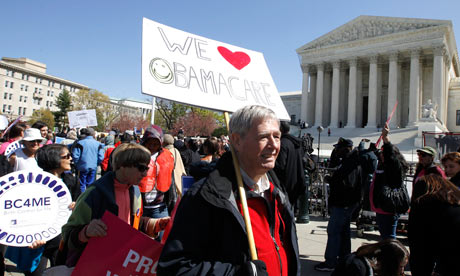http://www.guardian.co.uk/world/2012/mar/28/supreme-court-final-arguments-healthcare-reforms

US supreme court to consider final arguments on Obama's health reforms
Third day to focus on whether bill can still work without individual mandate, after justices appeared to tilt against it on Tuesday

Wednesday's arguments will focus on discrimination, and whether firms can forbid coverage to people with pre-existing conditions. Photograph: Charles Dharapak/AP
The US supreme court begins a final day of hearings over the constitutionality of Barack Obama's sweeping health reforms that has taken on added significance after a majority of justices appeared to tilt against the legislation on Tuesday.
The third day of hearings will consider whether the entire 450 provisions of the healthcare legislation will fall, including requirements barring discrimination in insurance rates and forbidding insurance companies from refusing coverage to people with pre-existing conditions, if the court strikes down the issue at the core of the legal challenge to the law – the requirement for almost all Americans to have medical insurance.
Before the supreme court began considering the case against what is derided by its critics as "Obamacare" on Monday, the question of whether the failure of the mandatory insurance requirement could bring down all of the reforms was largely considered an afterthought amid predictions from within the government and legal establishment that the law would be upheld.
But the tone of the questioning by conservative supreme court justices on Tuesday appeared to signal to the conservative majority on the court that Congress has overstepped its powers.
The Obama administration and the 26 US states challenging the Patient Protection and Affordable Care Act agree that the insurance requirement, known as the "individual mandate", is a key component, without which the law cannot work. So the court has hired a lawyer to make the alternative argument that the rest of the legislation can remain in place even if compulsory insurance is struck down.
Randy Barnett, a lawyer for business interests that have brought the action at the supreme court alongside the 26 states, said he believes that the judges will strike the whole law down.
"The government itself concedes that the individual mandate cannot be disconnected from the regulations that are being imposed on the insurance companies," he said. "You pull the heart out of a body and the body dies. The bill is remarkably interconnected and I don't think the act could survive as Congress intended it to if you take those parts of it away."
If the court were to declare the individual mandate unconstitutional, the way would still be open to Congress to amend the legislation to bring it in compliance with the constitution. However, the Republicans have taken control of the House of Representatives since the law was passed, and they have pledged to try and kill it.
The court is expected to hand down its decision in June. If it goes against Obama it could undermine his re-election campaign and embolden the Republican opposition.
The future of the reforms is uncertain after the health legislation faced a rigorous challenge from conservative justices on Tuesday who described it as fundamentally changing the relationship between the individual and the government, and as giving Congress virtually unlimited power to force people to buy products for their own good.
Some of the strongest questioning came from Anthony Kennedy who is considered a swing vote. He put it to the government's lawyer, the US solicitor-general, Donald Verrilli, who is defending the law, that the new law appeared to be "changing the relation of the individual to the government".
"Do you not have a heavy burden of justification to show authorisation under the constitution?" he asked.
Kennedy questioned whether the government had the power to force people to do something for the good of others.
"The reason this is concerning is because it requires the individual to do an affirmative act. In the law of torts our tradition, our law, has been that you don't have the duty to rescue someone if that person is in danger. The blind man is walking in front of a car and you do not have a duty to stop him absent some relation between you," he said.
"Here the government is saying that the federal government has a duty to tell the individual citizen that it must act, and that is different from what we have in previous cases. That changes the relationship of the federal government to the individual in the very fundamental way."
Kennedy appeared concerned that if the court finds the new law is constitutional it would open the way for Congress to claim virtually unlimited powers. He pressed Verrilli for evidence that this would not happen. The solicitor general responded that health care is a unique market but that did not seem to satisfy the judges.
The chief justice, John Roberts, put it to Verrilli that if the court upholds the legislation then "all bets are off", and that Congress would have virtually unlimited power to force people to buy products in the name of the collective good.
"Can the government require you to buy a cell phone because that would facilitate responding when you need emergency services? You can just dial 911 no matter where you are?" he asked.
The government says healthcare is unique in that almost everyone will use doctors and hospitals at some point in their lives, and that requiring the young and healthy to buy insurance even though they may have no immediate need to make use of it spreads the risk and reduces the cost of premiums. That, in turn, makes insurance more accessible.
But lawyers for 26 US states challenging the legislation say that Congress has gone beyond its powers by, for the first time in its history, requiring people to buy a product from the private sector.
The Obama administration is defending Congress's right to require health insurance under a clause in the constitution that gives the federal government the right to regulate interstate commerce.
Tidak ada komentar:
Posting Komentar